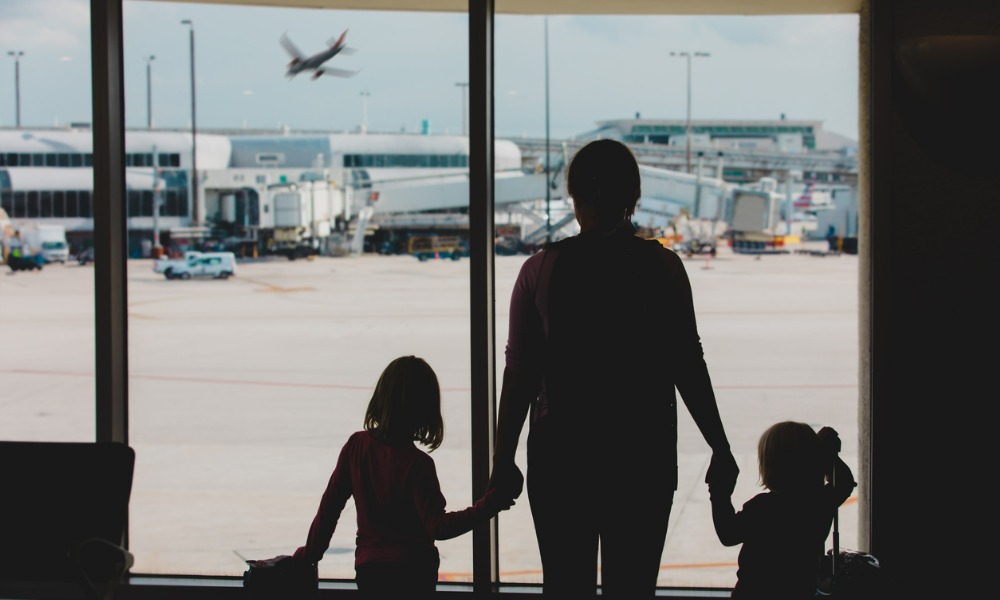
The mother removed the children from their UK home and travelled with them to Calgary

The Alberta Court of Appeal has upheld the decision to return the children to the UK in a case involving alleged abduction under the Hague Convention.
In Osaloni v Osaloni, 2023 ABCA 116, Akintayo Osaloni and Faustina Iyekekepolor were married and residing in the UK when Iyekekepolor removed their two minor children from their family home through a bedroom window and travelled with them to Calgary. Both children have British and Italian citizenship. The children’s father, Akintayo Osaloni, contacted the UK authorities, who subsequently alerted their Alberta counterpart. Osaloni also commenced a Hague Convention application in Calgary.
The Alberta court granted Osaloni’s request to have the children returned to the UK because the children were “habitually resident” in the UK when they were removed, Osaloni was exercising “rights of custody” over the children when they were removed, the children’s removal breached those custody rights, Osaloni did not consent to the children travelling to Canada, and the children would not suffer a “grave risk” of “physical or psychological harm” if returned to the UK.
Iyekekepolor appealed the chambers judge’s decision to the Alberta Court of Appeal. Iyekekepolor argued that there was no abduction because the father consented to the trip, that the children were not habitually resident in the UK, and that, in any event, the children were at grave risk of harm in the UK under their father’s care.
Iyekekepolor suggested that the children were “habitually resident” in Italy or Slovakia, not the UK. The court agreed that a child’s habitual residence does not need to be their location immediately before their removal. However, the court found no basis to conclude that the children’s habitual residence was elsewhere in the UK. The court found that the children’s only connection to Italy appeared to be their citizenship. The court explained that to determine whether the removal or retention of a child is wrongful, courts must consider where the child was “habitually resident immediately before the removal or retention.” The court found that the parties and the children had been living and working for nearly two years in the UK, where the children were also going to school and accessing health care.
Moreover, the court found no suggestion that the children might be “habitually resident” in Canada as neither child had even been to Canada before the alleged abduction. The court said that even if the children may have since developed some ties in Canada, these are irrelevant in determining habitual residence.
The appeal court explained that as the parent opposing the children’s return, Iyekekepolor had the onus of establishing that returning the children to the UK would amount to an intolerable situation or that “there is a grave risk that his or her return would expose the child to physical or psychological harm.”
Iyekekepolor stressed on appeal that the children would be better off in her custody than their father, and she has always been the children’s primary caregiver.
The court said that a Hague Convention application is not meant to determine custody but to return the child to the jurisdiction most appropriate to decide on custody issues and access to the child. The court also said that Iyekekepolor could not simply satisfy the grave risk of harm exception by being the children’s primary caregiver. The court emphasized that separating a child from their primary caregiver does not meet the harm threshold, as it depends on individual circumstances.
The chambers judge noted no allegations that the father would harm the children. The appeal court said that in the particular circumstances of this case, it was open to the chambers judge to conclude that the harm threshold had not been met.
The court further said that Iyekekepolor could not rely on the harm created by a return order separating the children from her, their primary caregiver, insofar as she created that harm by unreasonably refusing to return. The court said that any unjustified refusal to return by Iyekekepolor is not in the children’s best interests.
The court concluded that issues regarding custody and access must be determined in the UK, where their best interests will be considered.